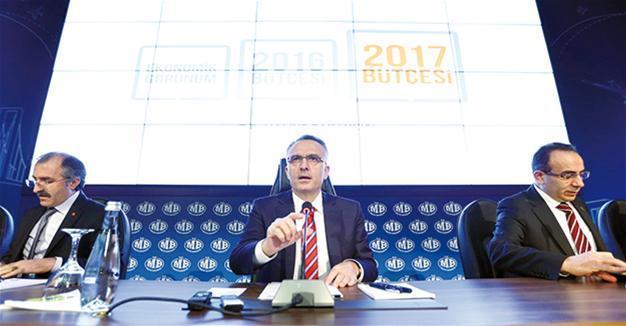Turkey focuses on growth in 2017 state budget
ANKARA

AA photo
Turkey’s government has released what it calls a “growth-friendly budget” that aims to stimulate the economy over the next few years, according to Finance Minister Naci Ağbal.
“The 2017 budget will be a growth-friendly one, underlining the main characteristics of it. Our fiscal policy will focus on stimulating the economic growth during the 2017-2019 period,” Ağbal said Oct. 17.
A deficit of 46.9 billion Turkish Liras ($15.2 billion) and a non-interest surplus of 10.6 billion liras ($3.4 billion) are expected in the 2017 budget, he said.
The ministry estimates that budget expenses for the 2017 fiscal year will reach 645.1 billion liras ($208.8 billion), while budget income will reach 598.3 billion liras ($193.6 billion), according to Anadolu Agency.
“More resources will be allocated in order to foster a qualified work force, innovation and investments to boost production and exports,” he said.
In this vein, real sector incentives are expected to be hiked to 32.4 billion liras ($10.5 billion) in 2017. Some 58.4 billion liras ($19 billion) will also be allocated to municipalities.
Around 10 billion liras ($3.3 billion) is expected to be spent on planned investments in the country’s 23 eastern and southeastern provinces.
Lion’s share to transportation
Ağbal said the biggest portion of public investment would be allocated to the transportation sector in 2017 with 22.1 billion liras ($7.1 billion), followed by the education and agriculture sectors with 13.7 billion liras ($4.43 billion) and 10.3 billion liras ($3.3 billion), respectively.
“The central government’s budget gap will reach 1.7 percent of GDP in 2017, but we aim to reduce it to 1 percent in 2018,” said Ağbal.
“We plan to reduce the EU-defined debt stock, which is expected to be 32.8 percent by the end of 2016, to 31.9 percent by the end of 2017, and to 29.9 percent by the end of 2019,” he added.
Ağbal also said Turkey ran a 12 billion-lira ($3.88 billion) budget deficit over the first nine months of 2016, according to Anadolu Agency.
He noted that the budget deficit in September was 16.9 billion liras ($5.46 billion).
“The deficit was 1.4 billion liras ($451 million) less than the same period in 2015. We maintained budget discipline in the first nine months of the year and will continue to maintain it in the coming months,” added Ağbal.
The state revenues in September stood at 36.1 billion liras ($11.63 billion), a 6.6 percent rise year-on-year, while budget expenditures were 53 billion liras ($17.1 billion), up 10.5 percent from a year earlier, according to data compiled by Anadolu Agency.
60,000 new personnel
According to the ministry, The Turkish government’s budget revenues reached 404.5 billion liras ($130.4 billion) in the first nine months of the year, a 14.2 percent rise over the same period last year.
Tax revenues also rose nearly 10.3 percent within the period to 329 billion liras ($106 billion). Budget expenditures for the January-September period rose to 416.5 billion Turkish liras ($134.2 billion), marking a 13.3 percent increase year-on-year.
Ağbal noted that the tax revenue has been somewhat lower than estimated before, while adding that revenues were expected to increase in 2017.
He added that around 60,000 new personnel would be hired by the public sector, representing a decline from previous years.
The government’s expenditures for health, pensions and welfare rose nearly 19.8 percent in the first eight months of the year to 18 billion liras ($5.8 billion) compared with the same period last year.
Personnel expenditures rose 19.6 percent, reaching 113 billion liras ($36.41 billion) in January-September 2016.
Interest expenditures stood at 41.7 billion liras ($13.4 billion) in that period, representing a fall of 6.9 percent.
The government is aiming for a budget deficit of 29.7 billion liras (nearly $10 billion) at the end of the year, according to the Finance Ministry.
